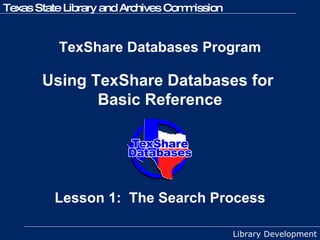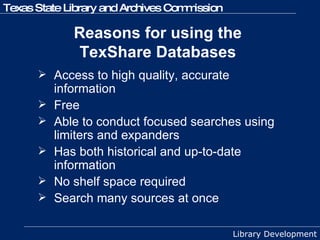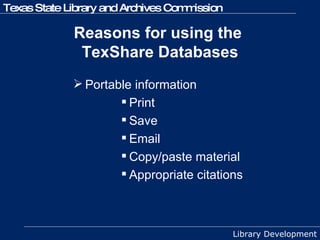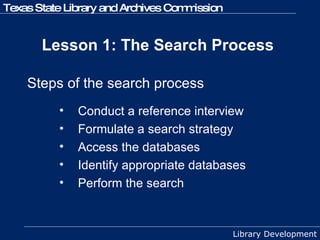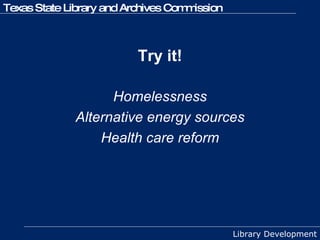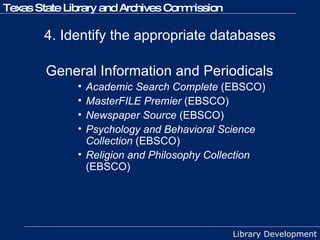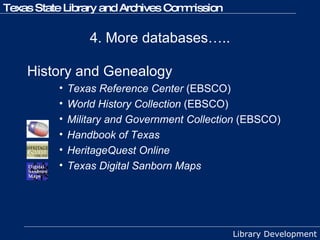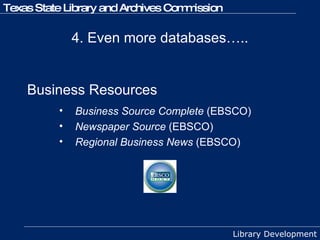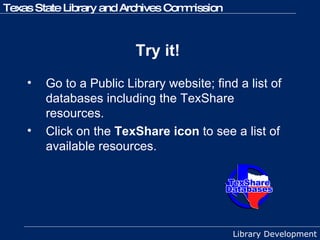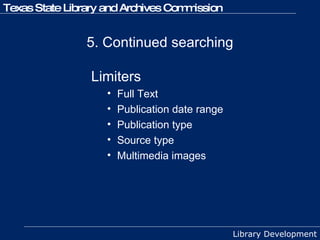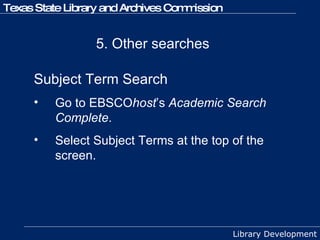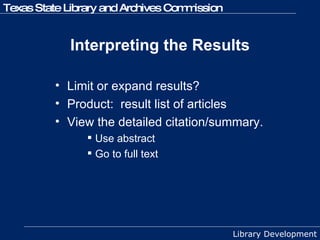TexShare Databases Basic Reference Lesson 1
- 1. TexShare Databases Program Using TexShare Databases for Basic Reference Lesson 1: The Search Process
- 2. Introduction MasterFILE Premier Academic Search Complete Business Source Complete Newspaper Source Consumer Health Complete How to use the most common TexShare databases for basic reference in the public libraries :
- 3. Reasons for using the TexShare Databases Access to high quality, accurate information Free Able to conduct focused searches using limiters and expanders Has both historical and up-to-date information No shelf space required Search many sources at once
- 4. Reasons for using the TexShare Databases Portable information Print Save Email Copy/paste material Appropriate citations
- 5. Lesson 1: The Search Process Steps of the search process Conduct a reference interview Formulate a search strategy Access the databases Identify appropriate databases Perform the search
- 6. 1. Conducting the Reference Interview Information need Purpose or desired outcome Type and amount of information needed Types of sources needed The patron’s knowledge of the subject Previous searching efforts Project deadline Teacher demands for types of materials, if any Final product – report, essay, debate, poster, etc. Determine
- 7. 1. Interview continued…. Remember! Communicate with the patron in a receptive and polite manner Avoid using jargon Make sure the query you enter into the database is free of spelling or other errors Explain the search strategy and sources Help to narrow or broaden the search as needed
- 8. 2. Formulating a Search Strategy Keyword Phrase Subject term
- 9. Try it! Homelessness Alternative energy sources Health care reform
- 10. 3. Accessing the Databases http://www.libraryoftexas.org/
- 11. 4. Identify the appropriate databases General Information and Periodicals Academic Search Complete (EBSCO) MasterFILE Premier (EBSCO) Newspaper Source (EBSCO) Psychology and Behavioral Science Collection (EBSCO) Religion and Philosophy Collection (EBSCO)
- 12. 4. Databases, continued….. Homework and Education Primary Search (EBSCO Searchasaurus and Kids Search) Middle Search (EBSCO Kids Search, Student Research Center) MAS Ultra (EBSCO Student Research Center) ERIC - E ducation R esource I nformation C enter (EBSCO) Professional Development Collection (EBSCO)
- 13. 4. More databases….. History and Genealogy Texas Reference Center (EBSCO) World History Collection (EBSCO) Military and Government Collection (EBSCO) Handbook of Texas HeritageQuest Online Texas Digital Sanborn Maps
- 14. 4. Still more databases….. Health and Medical Health Source: Consumer Edition (EBSCO Consumer Health Complete) Health Source: Nursing/Academic Edition (EBSCO Consumer Health Complete) Natural and Alternative Treatments (EBSCO Consumer Health Complete) Health and Wellness Resource Center Health Reference Center Academic
- 15. 4. Even more databases….. Business Resources Business Source Complete (EBSCO) Newspaper Source (EBSCO) Regional Business News (EBSCO)
- 16. 4. Yet more databases….. Books and Literature 20 th Century Poetry Collections Contemporary Authors Contemporary Literary Criticism Dictionary of Literary Biography Literature Resource Center with Scribner and Twayne’s WorldCat
- 17. Try it! Go to a Public Library website; find a list of databases including the TexShare resources. Click on the TexShare icon to see a list of available resources.
- 18. Click on the Complete List of Databases link
- 19. Now click on All EBSCO Databases
- 20. 5. Perform the Search Basic Searches Contain one or more keywords or phrases. Use quotation marks to keep words within a phrase together when searching.
- 21. 5. Searching Advanced Searches Search using keywords or phrases. May be narrowed by using limiters, Boolean operators , and field codes . Limiters Narrow down the number of results Makes the list of results more useful .
- 22. 5. Continued searching Limiters Full Text Publication date range Publication type Source type Multimedia images
- 23. 5. Searching continued … NOT… … OR… … AND… Boolean Operators
- 24. 5. Other searches Subject Term Search Go to EBSCO host ’s Academic Search Complete . Select Subject Terms at the top of the screen.
- 26. Try it! Discussion questions What were some of the controlled vocabulary words and phrases? Did any of the words or phrases seem as though they would help to narrow the results?
- 27. Interpreting the Results Limit or expand results? Product: result list of articles View the detailed citation/summary. Use abstract Go to full text
- 28. Citation Detailed citation contains: Article abstract Source name Document type Article Book Newspaper Dissertation Other content Subject terms Use it!
- 29. Narrowing, refining, revising Narrow subject using Source types or Subject
- 30. Narrowing, refining, revising Search the Subject Thesaurus Add limiters Use Advanced Search option
- 31. Brainstorm and Suggest Too many results Too few results Irrelevant results Additional techniques?
- 32. Viewing the Final Results View results list - Patron decides which resources are acceptable. Click title in result list and view citation/summary OR Click “full text” link for the article. Displays in HTML or PDF
- 33. Viewing the Final Results Print Email Save Cite Export EBSCO folder Create a folder by signing in Save material up to 18 months a. b. c. d. e. f.
- 34. Discussion Electronic databases vs print resources Electronic databases vs. free internet search engines Types of full-text formats?
- 35. Lesson Summary Components of reference interview; why it is a vital step When to use databases rather than Web search engines or print sources How to access all TexShare databases How to formulate a search strategy; types of searches; database limiting features; basic & advanced search techniques. How to create & use a personal EBSCO folder.
Editor's Notes
- #3: TexShare provides access to a large number of subscription-based databases that include both academic and general reference information. Magazines, newspapers, images, primary source documents, radio and TV news transcripts provide a wide range of topics including business, health, current events, animal science, ethnic and multicultural studies, history, music, psychology, religion, and women’s studies, etc.
- #6: Gather information from the patron about the search Determine which references are best to use for the query (databases vs. Web search engine, print sources, library catalog) Show patron where databases may be found on library website Show patron list of databases available with summaries to help them decide which to use Demonstrate how to conduct a search – use of limiters, expanders, quotation marks, etc.
- #7: Use open-ended questions!
- #8: At the end of the reference interview, rephrase the patron’s questions and responses to ensure that both you and the patron have an understanding of the information needed.
- #9: When formulating a search strategy, first brainstorm about a list of keywords and phrases to use during the search. Then decide which limiters to apply during the search.
- #10: Break into pairs and select one of these examples. Brainstorm a list of keywords and phrases and determine possible limiting factors. Discuss a list of keywords, phrases and limiting factors and why they were chosen.
- #11: Accessing the TexShare databases and a library’s own subscriptions from the library’s website offers patrons a single, convenient place to search. Library system administrators may contact the TexShare Technical Operations Specialist at (512) 463-7402 for information about their library’s user ids and passwords.
- #12: Generally, these databases cover many topics and can be used for most searches. They include many different types of sources, such as scholarly journals, magazines, newspapers, reference books, primary source documents, and images. Example searches: - Children and Nutrition - Energy Conservation - Attention-deficit Disorder - Renewable Resources
- #13: Designed for students and teachers, these age-appropriate databases for students at the primary and secondary levels, include teacher resources and professional development articles. Example searches: - “I have a dream” speech - President Obama and education - Recycling - Desert habitats - Terrorism and the United States - Homeless people - Georgia history, map, flag, photos
- #14: The databases designed specifically for historical research include: Example searches: - Texas wildflowers - Texas Indians - Military bases in Texas - Democratic Party in Texas - Qualifications to join Navy Seals
- #15: This group of databases contains health and medical information for both health professionals and consumers. Some of these databases contain scholarly, academic articles and research, while others include health information written for the general public . Example searches: - Diabetes - Attention-deficit videos - Pamphlet about knee surgery - Is MRSA gone from schools? - Drug Ambien - Diagrams of brain, eye, heart - Alzheimer’s disease
- #16: This group of databases provides information on topics related to business, including marketing, management, accounting, finance, and economics. They also provide scholarly journals on business, country and industry reports, company and business reports. Example searches: -Company profiles -Industry profiles -Country profiles -Latest copy of Business Week -Strengths and weaknesses of WalMart
- #17: These databases contain information regarding authors and their works. Some provide full text of poems or other works, while others provide scholarly criticism Example searches: - Analysis and criticism of The Adventures of Huckleberry Finn - Biographical information about William Shakespeare
- #21: In this step, the search strategy comes in to play. Use a list of keywords and phrases and a general idea of the limiting features to begin the search. Remember there are three common types of searches: Keyword Phrase Subject term
- #22: In this step, the search strategy comes in to play. Use a list of keywords and phrases and a general idea of the limiting features to begin the search. Remember there are three common types of searches: Keyword Phrase Subject term
- #24: AND: Narrows a search to include only results containing all words separated by this operator. For example, ocean and pollution finds all results that contain both terms. OR: Broadens a search to include results containing any word separated by this operator. For example, ocean OR whale finds results that contain either ocean or whale. This is effective when search terms have synonyms or spelling variations. NOT: Narrows a search to exclude words following this operator. For example, ocean NOT whale finds results that have the term ocean but not whale .
- #27: Example Search: A parent wants to learn more about the education of children with Down Syndrome. The keywords she has been trying have yielded too many results. Recommend that she use a subject term search to generate some possible search terms to help narrow the results. Follow with discussion
- #30: The Results pages of many TexShare databases contain menus for narrowing the results. These menus are typically located on the left or right side of the result list. For example, searching for the topic economy of France in MasterFILE Premier returns numerous results. The patron could narrow the results by using the Source Types like Periodical, Newspapers, or Country Reports. The results could also be narrowed by Subject by selecting France, France –economic conditions, Gross domestic product, etc.
- #32: For too many results , try the following: Use more specific keywords, phrases, and/or subject terms Use limiters, including Full Text, Publication dates, Peer Reviewed Use Boolean operators, including AND, OR, NOT Use quotation marks around phrases For too few results , try the following : Use broader keywords and/or phrases Use different keywords and/or phrases Use different Boolean operators Remove some or all of the limiters Use “expanders”, including “Search within the full text”, or “Use related words” For irrelevant results , try the following: Use different keywords and/or phrases Search in a different database Use the “more like this” feature
- #34: Personal EBSCO folder Create a personal EBSCO folder: After temporarily saving your articles and images, click on Sign In . Complete the “I’m a new user” form, creating a personal user id and password in the process. Then click the Submit button. Save to personal EBSCO folder: After creating a personal EBSCO folder, a patron can save articles, searches, images, videos, persistent links, and more to a personal folder with user id and password protection. All materials are saved for at least 18 months and can be accessed any time the patron uses an EBSCO interface
- #35: Electronic databases vs print resources – Historical and up-to-date, timely information Require no library shelf space Allow patron to search may sources at one time Allow both small & large libraries access to the same resources Remotely accessible Electronic databases vs. free internet search engines - Provide full bibliographic citations in various formats Reliable sources from reputable publishers Results can be easily narrowed to identify most-relevant information No advertisements Results can be sorted by reading level Types of full-text formats? HTML only HTML & PDF PDF only
- #37: ~ Break ~
